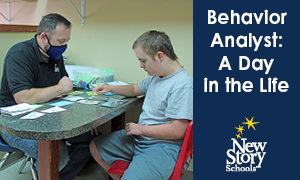Weekly Tips for Surviving Back to School
Posted: August 11, 2021 | Written By: Jessica Sharpe | Category: At Home Help

For some families, preparing for a new school year can be exciting. Your child is heading off to begin a new grade level, they are getting older and gaining more responsibilities and developing their own routines. However, for the family who has a child with autism or other special needs, getting ready to embark on a new school year can be stressful, challenging, and completely overwhelming for both the child and the family. So, what can you do to attempt to avoid these unfortunate pitfalls and start a new school year off right?
Getting back to Basics
During the summer, our schedules are less structured. We are enjoying the longer days and the freedom and flexibility to slow down and steer off track a bit. Though, as we say goodbye to June and July, we know we need to begin getting back on track and returning to basics. How do you do that you ask? Follow this weekly series on tips of getting back into the routine and not only surviving, but thriving in back to school.
A Month before the Start of School:
- Begin to reset your child’s bedtime and wakeup schedule.
- Begin talking about school. This might look like looking at pictures of their teachers and peers from the previous school year. Discuss all the activities that happen when they are at school, so that you can talk about school in a positive way.
- Create a morning and evening schedule with your child. If you have an elementary-aged child, keep the schedule clear and use pictures to support your schedule. If you have a middle school or high school child, create the schedule together!
Three Weeks before the Start of School
- If applicable, go shopping together for school supplies. Allowing as much choice as possible when selecting the necessary items.
- Try making a social story about returning to school with your child and then review this often to help your child get in the mindset of returning to school.
- Help your child get used to returning to a typical feeding schedule. Attempt to have breakfast and dinner at the same time in which it is scheduled during the school year. Then incorporate snacks into the routine by having this available in a specific location at a certain time (i.e. 9 a.m. and 2 p.m.). If your child continues to request snacks outside of the scheduled time, remain accountable to your schedule, but offer choices for snacks, varying snack items, or including your child to help you prepare a snack.
Two Weeks before the Start of School
- In the evenings, give your child controlled choices when choosing clothing for school. This means you pick two outfits that you are OK with, but allow your child to choose which one to wear. This will save you time in the morning of needing to choose clothing and potentially running into morning battles or tantrums. By starting this routine early, hopefully your child will be used to this process.
- Try meal-prepping. This may not be as important to your child but will certainly help make mornings and evenings run a bit smoother, especially at the beginning of the school year as everyone adjusts back to this routine.
Back-to-School Survival
Overall, being proactive and being prepared will serve you and your child well as you get ready for another new and exciting school year. When beginning to place and increase the structure back into your daily routine, include your child as much as you can and make it fun! At the start of the increasing structure, reward your child frequently for things such as checking their schedule, taking ownership of it themselves, asking help to use the schedule, and following your directions. This will allow your child to see the benefits of routines and schedules.
We all use schedules and timers to keep ourselves organized, so let your child see you using these things so they can see that it is not only something they can do, but that it is something everyone does to be prepared and organized.
Of course, there are always those days in which nothing goes to plan, don’t stress but in the moment teach your child how to work through the ups and downs, stay positive, start early, do what works best for your child and your family, and remember to just have fun!
Want to be notified of new articles and resources from New Story Schools? Submit your email and opt into our newsletter!









